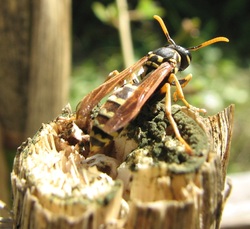
I have found over the years that watching insects and by following the movements of various species, that a great deal of interesting behaviors can be observed. For this post I have been following wasps, (from the order Hymenoptera) to see if I can alter the activities of the colony. Wasps, in many parts of North America are called yellow jackets, and are very different from bees, particularly the honey bees. While bees are typically docile and collect nectar that in turn pollinates plants, wasps are parasitic and live on insects. They do inadvertently pollinate plants to some degree as they also seek nectar as a supplemental food source when they become adults. They like corn as there is a great deal of available sugar. And, they are extremely aggressive and will swarm to sting any intruders or threat to the colony. I accidentally found this hive in an abandoned hole left by a gopher or other digger. It happened to be right next to my corn in a raised bed. When I went to pick some corn they attacked and I slowly retreated. I was surprised as wasps typically build hives in protected areas and not in holes in the ground. But, I began to wonder if an altered entry would prevent them from normal colony activity. So, I modified a cylindrical transparent container and called it a dome as in the TV show, which I refuse to comment on! From the video you will see as I did that this colony was quite large and very aggressive. At one point there were at least 20 wasps around me or on me but I did not run or show fear so they did not sting me. Hey anything for science! Enjoy the experiment…
 RSS Feed
RSS Feed
